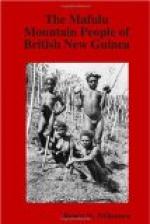The feather erections used at special and important dances, and especially those worn by chiefs, are enormous things, towering 6 or 12 feet above the wearer’s head, and are generally larger than those of Mekeo. They are held in a framework, which has an inverted basket-shaped part to rest on the head, and downward pointing rods, which are tied to the shoulders. The frames are to a great extent similar to those of Mekeo, but, having a larger burden to bear, they are more strongly made. These feather erections and their frames are seen in Plate 70.
Here, as in other parts of New Guinea, both men and women, but especially men, love to decorate themselves with bright flowers and leaves and grasses, these being worn in the hair and in bunches stuck into their belts, armlets and leg-bands, and indeed in any places where they can be conveniently fastened.
It is not the practice with the Mafulu for mothers to wear the umbilical cords of any of their children, though apparently the Kuni people do so.
CHAPTER IV
Daily Life and Matters Connected with It
Daily Life.
The early morning finds the wife and young children and unmarried daughters in the house. The husband has been sleeping either there or in the emone (clubhouse), but most probably the latter. The unmarried sons are in the emone, except any very young ones, who have not been formally admitted to it in a way which will be hereafter described. The women cook the breakfast for the whole family inside the house at about six or seven o’clock, and then take the food of the men to the emone. After breakfast most of the men and women go off to the gardens and the bush. The women’s work there is chiefly the planting of sweet potatoes, taro and other things, and cleaning the gardens; and in the afternoon they get food from the gardens and firewood from the bush, all of which they bring home to the village; also they have to clear off the undergrowth from newly cleared bush. The men’s work is mainly the yam and banana and sugar-cane planting, each in its season, and the cutting down of big trees and making fences, if they happen to be opening out new garden land. They also sometimes help the women with their work. Or they may have hunting expeditions in the bush, or go off in fishing parties to the river. In all matters the men of Mafulu, though lazy, are not so lazy as those of Mekeo and the coast. In the middle of the day the women cook the meal for everyone in the gardens, this being done on the spot, and there they all eat it. At three, four, or five o’clock all the people of the village have returned to it, except perhaps when they are very busy taking advantage of good weather for making new clearings or other special work. In the evening they have another meal cooked in the village. At every meal in the village the pigs have to be fed also, these sharing the food of the people themselves, or feeding on raw potatoes. Unless there is dancing going on, or they are tempted by a fine moonlight night to sit out talking, the people all terminate their routine day by going to bed early.




